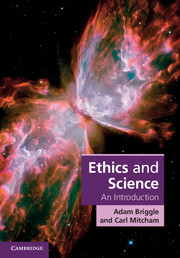Book contents
- Frontmatter
- Contents
- List of figures and tables
- Preface
- 1 Introduction and overview
- 2 Ethical concepts and theories
- 3 Science and its norms
- 4 Research ethics I
- 5 Research ethics II
- 6 Research ethics III
- 7 The science of ethics
- 8 Transition
- 9 Science and politics I
- 10 Science and politics II
- 11 Science and ideational culture
- 12 Science applied
- Epilogue Looking back, leaning forward
- Appendix Ethics codes
- Bibliography
- Index
- References
10 - Science and politics II
Science for policy
Published online by Cambridge University Press: 05 November 2012
- Frontmatter
- Contents
- List of figures and tables
- Preface
- 1 Introduction and overview
- 2 Ethical concepts and theories
- 3 Science and its norms
- 4 Research ethics I
- 5 Research ethics II
- 6 Research ethics III
- 7 The science of ethics
- 8 Transition
- 9 Science and politics I
- 10 Science and politics II
- 11 Science and ideational culture
- 12 Science applied
- Epilogue Looking back, leaning forward
- Appendix Ethics codes
- Bibliography
- Index
- References
Summary
The previous chapter explored the ethical dimensions of policies that guide the conduct of science and raised questions about scientists’ responsibilities for the broader outcomes of their work. This chapter continues to focus on science in its social context, with emphasis shifted to the role of science and scientists in informing public policy. Considering how scientists ought to contribute to political decision-making and policy formation raises ethical issues about relationships scientists have with the military, courts of law, and the media. This in turn prompts further questions about science and culture, which will be explored in the next chapter.
Setting the stage: climate change and an inconvenient heretic
No policy issue has been more dependent on input from science and more contested than that of global climate change. Global climate change refers to the ways average planetary weather patterns alter over time. For example, evidence of ancient climates shows that in the last 800,000 years the planet has seen a series of oscillations between ice ages and warmer interglacial periods. Because of the long timescales involved, climate change is not subject to direct individual experience; humans experience weather, not climate. Science is needed to identify climate change. The scientific study of climate or climatology depends in turn on interdisciplinary analysis of the atmosphere, including circulation patterns and interactions with ocean and land masses; the global monitoring of weather patterns along with human historical records; measurements of ancient atmospheric compositions from small samples of air trapped for thousands of years in glacial ice cores and dendrochronological reconstructions of changes in plant growth; and more. This scientific dependence has encouraged the assumption that defining and responding to climate change are scientific and technological in nature.
- Type
- Chapter
- Information
- Ethics and ScienceAn Introduction, pp. 237 - 267Publisher: Cambridge University PressPrint publication year: 2012

